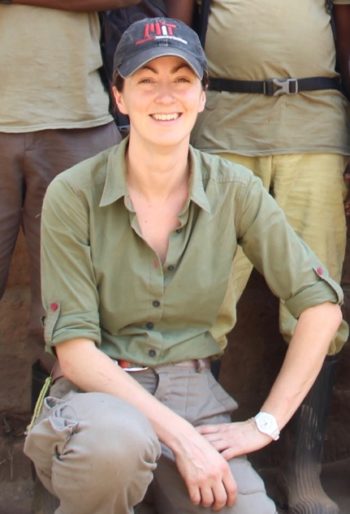International Women’s Day: Dr Cat Hobaiter
An interview with Dr Cat Hobaiter, Reader in the School of Psychology and Neuroscience, about her experiences and influences as part of International Women’s Day, Tuesday 8 March 2022.
What was your childhood ambition?
I was fascinated by so many things I really bounced around in my interests, but the common thread was that I loved working out how things worked. I had a tendency to take things to pieces, and then try to put them back together (which worked most of the time!) – but it could be anything from how an engine worked to how stars worked to why animals, including humans, behave the way they do.
 What inspired you to get involved in your area of research?
What inspired you to get involved in your area of research?
I’d love to tell you that I had a clear plan to become a primatologist – but honestly my career has involved a large amount of luck and serendipity.
I took an undergraduate class on behaviour that explored how evolution had shaped not only our bodies but also our minds – and that was fascinating to me. After graduating I went out to do fieldwork for the first time, studying forest baboon ecology. It was a wild shot-in-the-dark project, it wasn’t even clear that there were forest living-baboons in Budongo – and it took me three months to see more than footprints! But I loved it, and have never looked back – for me fieldwork is the perfect combination of science, problem solving, and exploration.
Is there a particular woman who has positively impacted your career?
As a primatologist I’m lucky to have an incredible range of women scientists to look to for inspiration and support. But this year I set up a new field-site in Guinea with two friends and colleagues who are also brilliant and, frankly, badass women scientists.
It’s been incredibly tough: this site is at the far end of the remote difficult fieldwork spectrum, but it’s been such a pleasure and privilege to tackle this as an all-woman team.
Whose voice would you like to amplify this International Women’s Day?
Primatology – like academia as a whole – remains fundamentally biased. We’re perhaps luckier than most in the extent to which we see women represented in our field, but the substantial barriers faced by scientists of colour, and in particular women of colour, need to be addressed.
The exclusion of local specialists from so many aspects of primatology is not only ethically problematic, but also impoverishes the scientific questions and conservation action that are supposed to be at the heart of our field.
As a part of addressing that, I’d love to see more institutional relationships built between the University of St Andrews and Universities and organisations in the countries where our research is conducted, like my own work in Uganda and Guinea.
Back to International Women’s Day in St Andrews.